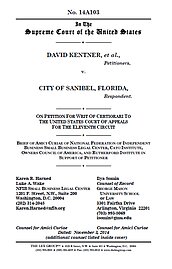Kentner v. City of Sanibel
Learn more about Cato’s Amicus Briefs Program.
David and Susan Kentner own residential lots along San Carlos Bay in Sanibel, Florida. Because their property is along the high-tide line, the Kentners enjoy an age-old common-law right to build docks over the water abutting their property, subject to reasonable regulation. But Sanibel passed an ordinance forbidding the Kentners and others from taking advantage of this common-law right. The city claimed that the ordinance was necessary to protect seagrass, which it called an “invaluable natural resource.” Whether or not seagrass is invaluable, the city passed the ordinance without considering whether seagrass was actually present in the areas subject to the ordinance and whether modern technology could effectively be used to avoid harming the seagrass. Moreover, there is evidence that the city passed the ordinance in order to satisfy the aesthetic preferences of certain interest groups and to enhance the property values of other dock-holders. On top of that, in 2006 the city issued itself an exemption to build a dock in San Carlos Bay, explaining that it should be allowed to build a dock because no seagrass was found on the site. The Kentners, represented by the Pacific Legal Foundation, challenged the ordinance on the ground that it did not substantially advance any legitimate government interest. In other words, the Kentners claimed that the ordinance violated the due-process rights to their property, which is lawyer-speak for laws that don’t have a good-enough justification. Both the trial and appellate judges held that property rights aren’t “fundamental rights” protected by due process, thus ruling that the government didn’t need a good reason to pass these restrictions. In other words, property rights simply don’t enjoy protection against irrational government regulations. On appeal to the Supreme Court, the Kentners argue that the lower courts were mistaken in treating property rights as no-class—not even second-class—rights. In support of the Kentners’ petition to have the Supreme Court hear the case, Cato joined the National Federation of Independent Business, Owners Council of America, and Rutherford Institute on a brief arguing that the lower courts were gravely mistaken in classifying property rights as not deserving of due-process protections. The Fourteenth Amendment, after all, explicitly says that no state shall deny “life, liberty, or property” without due process of law. Furthermore, the Court should review the case to clarify and solidify longstanding precedents that treat property rights as on par with other rights. After all, if the government is allowed to violate property rights with no justification whatsoever, then any ordinance that confiscates, destroys, or restricts property will be simply unassailable, regardless of how unreasonable or shocking it may be. The high court should take this case to reaffirm that property rights are indeed constitutionally protected and cannot be abridged with impunity by opportunistic, corrupt governments.

This work is licensed under a Creative Commons Attribution-NonCommercial-ShareAlike 4.0 International License.
